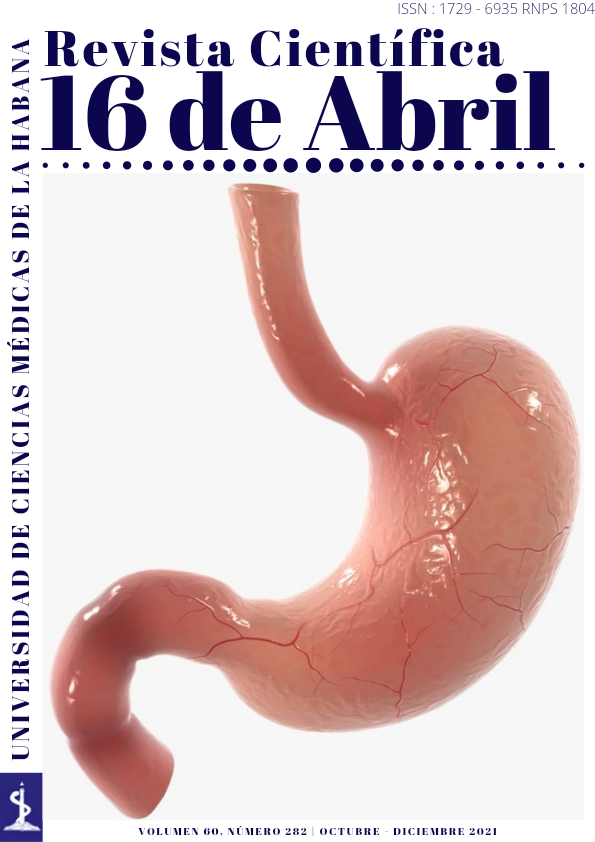Level of knowledge of medical students about Cushing´s Syndrome
Keywords:
Knowledge, Students, Medical, Cushing syndrome.Abstract
Introduction: cushing syndrome is a set of signs and symptoms of diverse origin that translate the exposure of tissues to a chronic excess of cortisol.
Objective: to determine the level of knowledge of medical students about Cushing's Syndrome.
Method: observational, descriptive, cross-sectional study in the period from May 1 to May 20, 2021. The universe consisted of 100 from third to sixth year of the race. Variables such as etiology, pathophysiology, clinical manifestations and diagnosis of Cushing's Syndrome were analyzed. The survey technique was used using a questionnaire-type instrument, it was applied virtually through Google Forms. The responses were archived in an email.
Results: most of the students corresponded to third year (45 %). The level of knowledge about the etiology of Cushing's Syndrome was regular with 41 %, while about the pathophysiology, clinical manifestations and diagnosis it was adequate with 63 %, 46 % and 52 % respectively.
Conclusions: there were difficulties in understanding the etiology of Cushing's syndrome, not being the case in the case of clinical manifestations and diagnosis. However, pathophysiology is the aspect where the greatest knowledge is verified.
References
2. Fleseriu M. Síndrome de Cushing - Síntomas, diagnóstico y tratamiento. BMJ Best Practice [Internet]. 2020 [citado 26/05/2021]. Disponible en: https://bestpractice.bmj.com/topics/es-es/20
3. MedlinePlus en español [Internet]. Estados Unidos: Bethesda; 2020. [actualizado 05/02/2020; citado 27/05/2021]. Disponible en: https://medlineplus.gov/spanish/cushingssyndrome.html
4. Smith Y. Epidemiología del síndrome de Cushing. News-Medical [Internet]. 2019 [citado 27/05/2021]. Disponible en: https://www.news-medical.net/health/Cushing s-Syndrome-Epidemiology-(Spanish).aspx
5. Nieman LK. Epidemiology and clinical manifestations of Cushing’s syndrome. UpToDate [Internet]. 2021 [citado 20/05/2021]. Disponible en: https://www.uptodate.com/contents/epidemiology-and-clinical-manifestations-of-cushing s-syndrome
6. AARP herramienta de salud [Internet]. California: Kahn A; 2020 [actualizada 20/08/2021; citado 27/05/2021]. Disponible en: https://healthtools.aarp.org/es/health/sindrome-de-cushing
7. Grossman A. Síndrome de Cushing - Trastornos endocrinológicos y metabólicos. Manual MSD [Internet]. 2020 [citado 26/05/2021]. Disponible en: https://www.msdmanuals.com/es/professional/trastornos-endocrinol%C3%B3gicos-y-metab%C3%B3licos/trastornos-suprarrenales/s%C3%ADndrome-de-cushing
8. García Y, Turcios S, Acosta A, Díaz C, Cabrera M, Robles E. Riesgo cardiovascular en el síndrome de Cushing. Rev Cuba Endocrinol [Internet]. Diciembre de 2014 [citado 27/05/2021]; 25(3):178-90. Disponible en: http://scielo.sld.cu/scielo.php?script=sci_abstract&pid=S1561-29532014000300006&lng=es&nrm=iso&tlng=es
9.Top Doctors [Internet]. España: Escanilla A; 2020 [Actualizado 09/05/2018; citado 27/05/2021]. Disponible en: https://www.topdoctors.es/diccionario-medico/sindrome-de-cushing
10. Orphanet. [Internet]. Francia:Bertherat J, Guignat L; 2020 [Actualizado 09/2012; citado 27/05/2021]. Disponible en: https://www.orpha.net/consor/cgi-bin/OC_Exp.php?lng=ES&Expert=553
11. Hansen S. J, Lacourt R. P, Hansen S. J, Lacourt R. P. Síndrome de Cushing iatrogénico en un lactante por uso prolongado de corticoides tópicos. Reporte de caso. Rev Chil Pediatría [Internet]. 2018 [citado 27/05/2021]; 89(3):368-72. Disponible en: http://www.scielo.cl/scielo.php?script=sci_abstract&pid=S0370-41062018000300368&lng=es&nrm=iso&tlng=es
12. Méndez P, Barrio R, Núñez M, Pérez C, Hernández R. Tratamiento de la enfermedad de Cushing con ketoconazol. An Pediatría [Internet]. 2009 [citado 26/05/2021]; 70(4):366-9. Disponible en: http://www.analesdepediatria.org/es-tratamiento-enfermedad-cushing -con-ketoconazol-articulo-S1695403308001136
13. Robles E, Leal L, Díaz C. Tratamiento farmacológico del síndrome de Cushing. Rev. Cuba Endocrinol [Internet]. 2014 [citado 26/05/ 2021]; 25(3):206-15. Disponible en: http://scielo.sld.cu/scielo.php?script=sci_abstract&pid=S1561-29532014000300009&lng=es&nrm=iso&tlng=es
14. Lahera M, Varela C. Prevalencia, etiología y cuadro clínico del síndrome de Cushing | Endocrinología y Nutrición [Internet]. 2019 [citado 27/05/2021]. Disponible en: https://www.elsevier.es/es-revista-endocrinologia-nutricion-12-articulo-prevalencia-etiologia-cuadro-clinico-del-S1575092209701913
15. Santos S, Gaztambide S, Salvador J. Diagnóstico y diagnóstico diferencial del síndrome de Cushing. Endocrinol Nutr [Internet]. 2009 [citado 27/05/2021]; 56(2):71-84. Disponible en: https://www.elsevier.es/es-revista-endocrinologia-nutricion-12-articulo-diagnostico-diagnostico-diferencial-del-sindrome-S1575092209705558
16. Empendium [Internet]. Argentina; Moćko K, Płaczkiewicz-Jankowska. 2020 [actualizado 28/10/2020; citado 27/05/2021]. Disponible en: https://empendium.com/manualmibe/social/article/250007
17. NICHD [Internet]. Estados Unidos; Bianchi D. 2014 [actualizado 12/09/2015; citado 26/05/2021]. Disponible en: https://espanol.nichd.nih.gov/salud/temas/cushing /información/causas
18. Díaz-Rodríguez YL, Vargas-Fernández M, Quintana-López LA. Efectividad de una Intervención educativa sobre el nivel de conocimiento de la COVID-19 en adultos mayores. Univ Méd Pinareña [Internet]. 2020 [citado 17 Oct 2021]; 16(3):[aprox. 0 p.]. Disponible en: http://www.revgaleno.sld.cu/index.php/ump/article/view/570
Downloads
Published
How to Cite
Issue
Section
License
Those authors who have publications with this journal, accept the following terms:
The authors will retain their copyright and guarantee the journal the right of first publication of your work, which will be under a Creative license Commons Attribution-NonCommercial-ShareAlike 4.0 International . (CC BY-NC-SA 4.0).
The authors may adopt other non-exclusive license agreements for the distribution of the published version of the work (eg:deposit it in an institutional telemat








